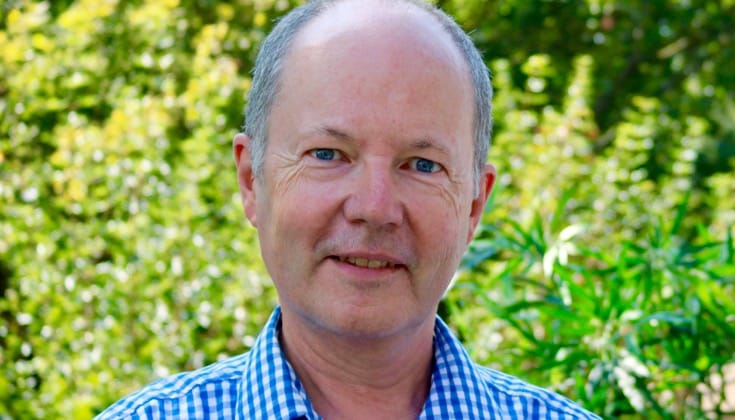In April, Buddhist lawyer James Thornton won an injunction ordering the UK government to publish a clean-air plan for British cities where pollution exceeds legal levels. Thornton is a lawyer and environmental activist whose 10-year-old environmental law organization, ClientEarth, tackles the planet’s biggest issues. The organization’s team of more than 100 people uses litigation to address climate change, biodiversity protection, habitat loss, deforestation, and air pollution.
The UK clean-air injunction has spawned a series of clean-air cases across Europe. And, in July, after ClientEarth fought for years against illegal logging by the Polish government, the European Union issued a logging ban on the Bialowieza forest in Poland, one of the last great primeval forests. The organization is now working on environmental law with the Chinese government.
Thornton began practicing environmental law in 1979, looking for purpose in his mission to save the environment. But as a young lawyer sometimes working 60 cases at once, he started to burn out.
The earth is our client, and the lawyer needs to speak to the client.
Tired and directionless, Thornton stumbled onto Soto Zen and moved to Los Angeles to study with Maezumi Roshi. Through sitting, Thornton realized that environmental law allowed him to practice Zen’s Bodhisattva Vow — the vow to save all sentient beings. He finally found meaning in his work.
Thornton talked to me from his office in London to discuss ClientEarth, Soto Zen, and the intersection of environmental activism and Buddhist practice.
Hal Atwood: Can you tell me about ClientEarth’s mission and the role of environmental lawyers in today’s world?
James Thornton: The way I think about it is that the earth is our client, and the lawyer needs to speak to the client. By studying science we know what the earth needs in terms of protection. Once we’re clear on what science is saying, then we investigate how to turn that into policy. We help write the laws, and then we work on implementing and enforcing the laws. We’ve won a lot of big cases, like against the UK government to clean up the air.
The law gives you a snapshot of what a culture thinks are the important values within it at any one time. By understanding that you gain tremendous leverage to move things in the right direction. I see the process of helping to create and enforce laws as a practice and a way of enlightening the shared mind as a culture.
Some remain unconvinced about climate change, or maybe it’s not such a big priority for them. How much patience and effort goes into convincing people to pay attention to the environment?
By using the courts and getting the UK government to come up with this clean air plan, we’ve already moved it in some direction. Before that, there was no plan. Before that, they were going to violate the law till the end of time, and no one would have held them to account. The plan that was issued is tremendously defective, and now the question is how to use tactics to force them to do it better.
None of this is easy. If you look at it in terms of one’s own practice, it’s like looking at one of the things you’re most reluctant to change and going back to it again and again.
How did you come to practice Buddhism?
Since I was a very young person, I had wanted to know what the meaning of my life was. I originally thought that Catholicism was going to give me that, but in my teenage years, I realized that I was gay. I realized a system that assigns me to hell without my volition is not a system of religion that makes any sense to me. I was left with a great loss, because I had dearly believed in it.
I went on to study philosophy at university to see if it would give me a clear indication of what the meaning of life was. While fascinating, it didn’t do that. Then, I thought human love would. Human love gives you many things, but the relationship I was counting on to give me that broke up. Then, I was a lawyer trying to save the planet and I thought that would be the meaning, and again I found that didn’t actually answer that question. I was really tired and wondered where I would go.
While anger gives you a lot of energy, the mind of anger isn’t the mind from which positive solutions can emerge.
I read Peter Matthiessen’s book, Nine-Headed Dragon River. His teacher’s teacher was Maezumi Roshi in Los Angeles. I started traveling down to do retreats with Maezumi. I took to Zen instantly. This practice was the door to the question of meaning. My life was a life I felt good about, having dedicated myself to saving the environment. The Buddhist vow of saving all sentient beings took on a central place for me. I realized that having already been an environmental lawyer that I was living out a version of that vow.
Does the concept of interbeing—the interconnection of all things—help you maintain focus in your work?
Yes, definitely. You can’t study biology without also understanding interconnection. It really informs everything I do.
I’ll give you a concrete example. The law that determines how people catch fish in the waters of the entire European Union was being updated some years ago. The prior version of it was a really bad system, and the result was that fisheries were on the point of collapse because way too many fish were being caught.
I said to my team, “The way we need to approach this is to start from scratch and think about it as a unified system.” What we want to do is create a system in which they can live together harmoniously. I don’t want us to think we need to prevent bad people from catching good fish. It’s just that we want the fish/people system to be healthy for a very long time. That turned out to be a very fruitful way to think about it. It removed a lot of barriers between us and a lot of people, so we didn’t come across as negative or antagonistic.
You have a team of 100 employees. Are there ways that you integrate Buddhism in the workplace?
From the beginning, I’ve tried to share practices that don’t seem particularly Buddhist to people, because I didn’t want any labels on things. We’ve always used the practice of deep listening. When we’re in meetings we’re listening attentively and without judgment to what our colleagues are saying, which I find is a core Buddhist practice, the purpose of coming to the place where you can think together creatively and cooperatively.
You need to nurture yourself while you’re taking care of everything else.
Since I was the founder of the organization, I didn’t want people to think they had to meditate in order to please me in some way. That’s exactly why you wouldn’t want to have people meditate. Then, just last year, groups of people in our three principle offices—London, Brussels, and Warsaw—all approached me asking if I would be willing to share my meditation practice with them. I went to each office and gave an interactive seminar for two hours per day for three days. Over the course of those seminars, I trained over half the staff. There are groups that now meditate in each office.
I saw that you led the First Green Order Retreat this June at the Zen Center of Los Angeles, in which you discussed how Buddhism can help with the environmental crisis.
What I wanted to do was take a deep look at our environmental problems from the perspective of the Four Noble Truths. [The goal was to] have a set of practices to look at your life in connection with the environment, gain positive vision to think about problems creatively, and motivate yourself to do positive action.
The retreat focused on what distinctive contribution Buddhism can make to the global environmental crisis. What conclusion did you come to?
That there’s quite a lot to contribute. Most people who start out as environmentalists are full-time activists with anger as motivation. While anger gives you a lot of energy, the mind of anger isn’t the mind from which positive solutions can emerge. In my view, the best work one can do for the environment is come up with a positive solution and a positive vision. In order to do that, you have to get beyond the mind of anger. Practice is the most effective way to get beyond that angry mind and into the open mind.
The other thing Buddhism can do is nurture activists—environmentalists can take care of themselves so they can take care of the environment. Doing any activist work is frequently a path to burnout. One becomes very dedicated and the work is boundless, so there’s a tendency to go beyond what is healthy for your system. What the practice allows you to do is realize that you need to nurture yourself while you’re taking care of everything else.
Finally, I think practice can put you in the place from which it begins to be possible to create a positive story of where to go in the future. That positive vision will capture everyone’s attention if the story is well told, and then motivate action in that direction.
A positive story is needed right now. The rate at which biodiversity is being harmed and species are going extinct is increasing. How do you work on this stuff on a daily basis without going nuts, burning out, or going into despair? This is where practice comes in. Practice is the perfect answer to despair, and despair is the enemy to protecting the future.

